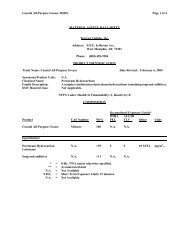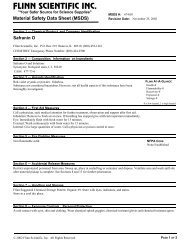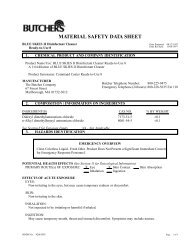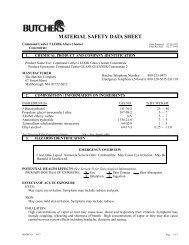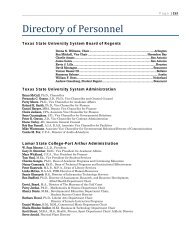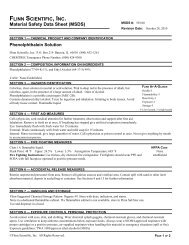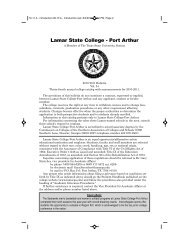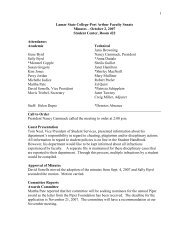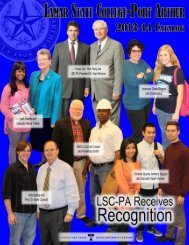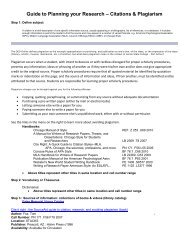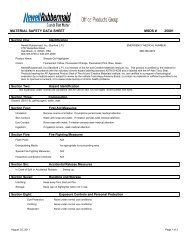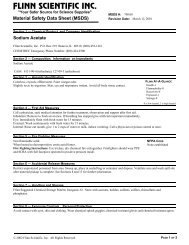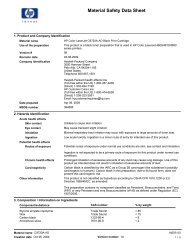Download Full Catalog - Lamar State College - Port Arthur
Download Full Catalog - Lamar State College - Port Arthur
Download Full Catalog - Lamar State College - Port Arthur
- No tags were found...
You also want an ePaper? Increase the reach of your titles
YUMPU automatically turns print PDFs into web optimized ePapers that Google loves.
Page | 60* Maintaining compliance with the U. S. copyright laws and software license agreement and;* Discouraging and monitoring for copyright infringement.Each user is granted non-commercial use of the computing and communications facilities and services of the <strong>College</strong>according to rules that may be posted at those facilities, and to the terms described in this publication. A student whoillegally duplicates software and/or its documentation, violates the policies of the Information Resources Use Policy orotherwise fail to comply with the college’s third-party software license agreements, will be subject to disciplinary actionup to and including expulsion from school.Computing Facilities Use Policies:The college’s computing facilities are provided for the support of college programs. All users are responsible for seeingthat these facilities are used only for transaction of college business. Computing facilities and accounts are owned by the<strong>College</strong> and may be used only for college-related activities.The <strong>College</strong> reserves the right to allocate and restrict access to computing resources. Users may not use computersystems, facilities or services in any way that diminishes or interferes with the reasonable and confidential use of thosesystems.The <strong>College</strong> retains the right to access and immediately remove any data or files evidencing any such misuse.Account access information assigned to an individual is not to be given to another individual. The individual assignedto an account is responsible for all activity for which that account is used.The following policies govern the use of all college computing facilities. Any use of these facilities in any way otherthan those stated below will be considered in violation of college policy.* Users are accountable for using computing facilities in an effective, ethical and lawful manner.* Use of college computing facilities to create, display, modify, or transmit files that are abusive, harassing,threatening, indecent, or illegal is expressly prohibited.* Material that might be considered indecent, abusive, harassing or threatening may be accessed, activated andviewed only insofar as those materials and resources are required to perform legitimate college-related functions.* Illegal material may not be accessed, viewed or stored on college computing facilities.* Conduct that involves the use of computing or communications resources to violate a college policy or regulation, orto violate another’s rights, is a serious abuse and can result in limitation of privileges and lead to appropriatedisciplinary action.Software Use Policies:Neither licensed software, nor college-developed software, shall be copied except as specifically stipulated in licenseagreements or in The Texas <strong>State</strong> University System Rules and Regulations. All software protected by copyright shallnot be copied except as specifically stipulated by the owner of the copyright.Students have permission to use licensed software according to the regulations set by the <strong>College</strong>. The use of suchsoftware is governed by the terms of licensing agreements between the <strong>College</strong> and the software licensors. Users mustread and abide by the terms of those agreements.Software applications shall not be used to create, modify, access, view, display or activate files, information ormaterials that are offensive, indecent or illegal.Manuals, and other copyrighted materials, shall not be copied without specific, written permission of the publisher.Internet Use Policies:The <strong>College</strong> maintains a connection to the Internet in support of its mission. Users must be aware that all Internetusage, including source and destination, can be recorded and stored. Users have no right to privacy with regard toInternet use.The <strong>College</strong> has the ability and right to view any user’s usage patterns and take action to assure Internet resourcesare devoted to maintaining the highest levels of productivity.The Internet path record is the property of the <strong>College</strong> and therefore the people of the <strong>State</strong> of Texas. Suchinformation is subject to the Texas Public Information Act and the state laws applicable to records retention.Using the college’s Internet connection to access information, images or other materials that violate any federal laws,state laws, Texas <strong>State</strong> University System rules or LSC-PA policies is strictly prohibited. Using the Internet connectionto access other computer systems in violation of state or federal law is prohibited. Using the Internet connection toaccess other computer systems in violation of the policies of the entity that owns those systems is strictly prohibited.Electronic Messaging Policies:Access to and the responsible use of modern information resources are essential to the pursuit and achievement ofexcellence. The <strong>College</strong> encourages the appropriate use of electronic messaging to enhance productivity. Use of theseresources must be consistent with the college’s goals of education, research, and public service.“Electronic messaging” refers to those computer applications such as e-mail, instant messaging, video and/or audioconferencing/collaboration, chat rooms, newsgroups, list servers, streaming media, message boards or any otherapplication that allows a user to interactively or passively communicate with one or more persons or entities using thecollege computing or communications resources.Responsible users of electronic messaging applications are expected to act in accordance with the following policiesbased on common sense, common decency and civility applied to the networked computing environment.Information sent as electronic messages should meet the same standards for distribution or display as if they weretangible documents or instruments. Users must be clearly and accurately identified in all electronic communications.



